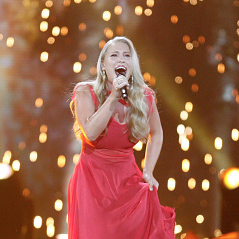Eurovision: Performances, parties and, of course, politics
Eurovision, the song contest where lyrics and gestures of a political nature are banned, has found politics creeping in yet again. As the annual competition reaches its climax this weekend, GERARD ESCAICH FOLCH reports.

http://gty.im/682061814
Australian Anja Nissen performs for Denmark in the second semi-final. Eurovision is the song contest where no lyrics, speeches or gestures of political nature are permitted, but politics always seeps in.
By GERARD ESCAICH FOLCH
There are only two things that are certain in life: Eurovision and politics.
The Eurovision Song Contest is the competition known worldwide for its dramatic performances saturated with acrobatics, smoke machines and, of course, glitter.
It comes to its annual outrageous climax this weekend from Ukraine, incongruously featuring two Australians in the final – our official entry, Isaiah Firebrace, and Anja Nissen, who won Australia's The Voice in 2014 and is there as Denmark's representative.
You'd think this spectacle of music and joy would surpass the everyday drudgery of politics.
In fact, organisers go out of their way to ensure politics is left at the door, with bans on the use of any lyrics, speeches or gestures of political nature.
But it always finds its way in, and this year is no different.
The song contest and European politics go hand in hand, according to Prof Alison Lewis, who runs Melbourne University’s Visions of Eurovision unit and is part of SBS's coverage of the event this year.
“In many ways, Eurovision is politics by another means,” Prof Lewis said.
“Each year it aims to transcend political divisions but it never quite manages to. Politics have a nasty habit of creeping in.”
http://gty.im/673127526
Banned Russian singer Yulia Samoylova.
How have politics crept in this year?
The two main sources of political tension in this weekend’s extravaganza are tensions between Ukraine and Russia, and, of course, Brexit.
Russia has had no competitor in the song contest this year. In fact, Russians will be unable to watch the broadcast as the show won't be broadcast.
This is because Ukraine’s authorities did not permit Russia’s selected singer, Yulia Samoylova, to enter the country, whose capital city of Kiev is hosting the spectacle. Authorities say she violated Ukrainian law by travelling to Crimea in 2015 to perform.
Crimea was annexed from Ukraine by Russia in 2014 and remains one of the most politically controversial places on the planet.
Prof Lewis said since Russia and Ukraine were at war, entering Crimea through a “Russia-backed backdoor” was considered illegal.
http://gty.im/680971398
Isaiah Firebrace in the first semi-final at Eurovision
She said preventing Russia’s singer, who uses a wheelchair, from entering the country was particularly bad press for Ukraine.
“Ukraine was caught in a Russian mousetrap, effectively, not wanting to recognise Russia’s presence in Crimea, and not wanting to look heartless by preventing a disabled singer from entering the country,” Prof Lewis said.
But this is not the only drama in the 2017 contest. This is the first Eurovision since the United Kingdom voted to leave Europe in June 2016.
Many were unsure if the UK should or could remain in the competition. When asked if the UK would leave the contest in upcoming years, UK Prime Minister Theresa May said, after a brief pause: “No.”
“[But] I’m not sure how many votes we’ll get,” she added.
Prof Lewis said she agreed that the UK would continue to perform in Eurovision. “As long as they don’t come last too often,” she said.
For this year’s performance, many suspect the UK’s Song Never Give Up On You is a subtle protest against the UK leaving the EU.
Prof Lewis said that there is a chance the song “is read as an anti-Brexit song, but on the surface, is just about love”.
Perhaps Eurovsion will always be inherently political.
All we can hope is that these tensions don’t bring down the mood of Eurovision parties all around the globe.





